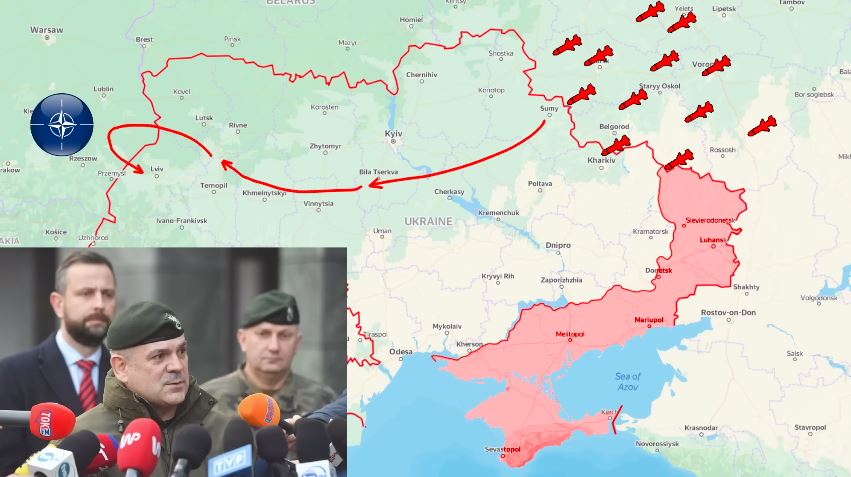On 29 December, the biggest battle took place in the sky, as Ukrainians were repelling the most massive missile and drone strike since the beginning of the war.
The Ukrainian Air Force Spokesman reported that they had never seen so many targets on their monitors at the same time. The basic approach was to overwhelm the Ukrainian air defense system and confuse the air defense operators.
Deciding on when and where to intercept a missile is actually very complicated. There are multiple layers of air defense rocket launchers, and if you just use those located on the first line to repel the first wave, then all prefrontal areas will be exposed during the second wave of attacks.
That is why the air defense operators are looking at the trajectories of the missiles and trying to figure out where each missile is heading. Some missiles, therefore, are allowed to pass through and are later intercepted by the air defense in the rear.
Russian forces obviously understand this and create very complex trajectories.
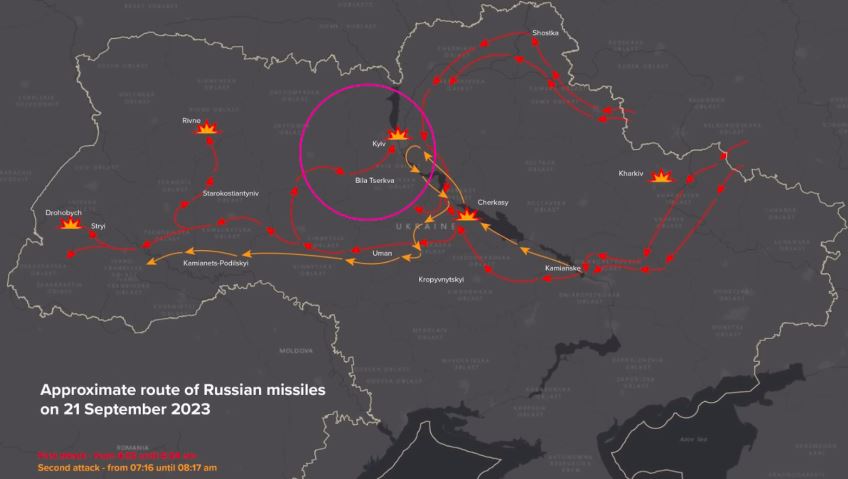
Sometimes, the missiles even turn around and try to hit the cities from behind. Today, Russian forces even used NATO airspace to attack Ukrainians from the back. The missile reportedly crossed the Polish border and then turned back to hit Ukraine.
Polish officials confirmed that Russian missiles were indeed detected in their sky, however, they decided not to escalate.
Moreover, some missiles are even capable of releasing false heat targets. In order to reduce Ukrainian defensive capabilities by unloading the air defense rocket launchers, the first wave of the massive strike involved a lot of drones. The drones were launched from the Bryansk and Rostov oblasts and spread out as they passed the contact line.
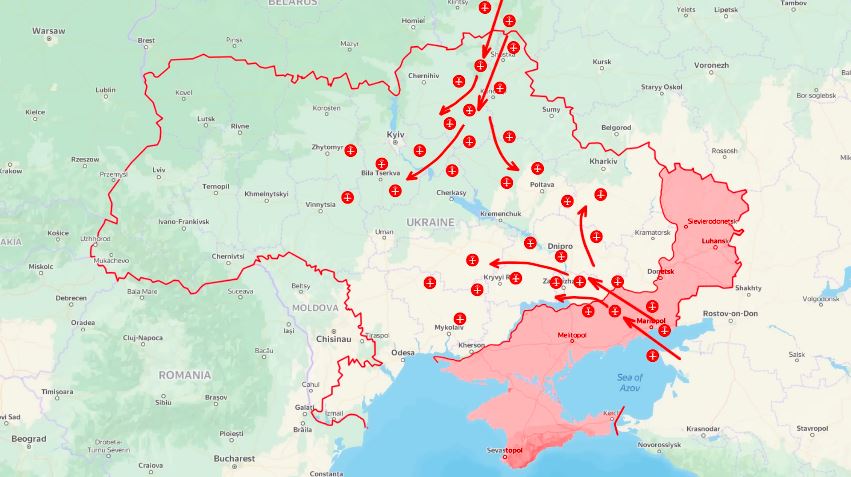
Shortly after launching 36 kamikaze drones “Shahed”, Russian forces launched 90 missiles “Kh-55” and similar types from the Kaspian base, then 14 ballistic missiles from Belgorod and Crimea, 8 missiles “Kh-22” and 5 notorious “Dagger” missiles from the north, and also 4 anti-radar rockets, and 1 missile “Kh-59” from the south.
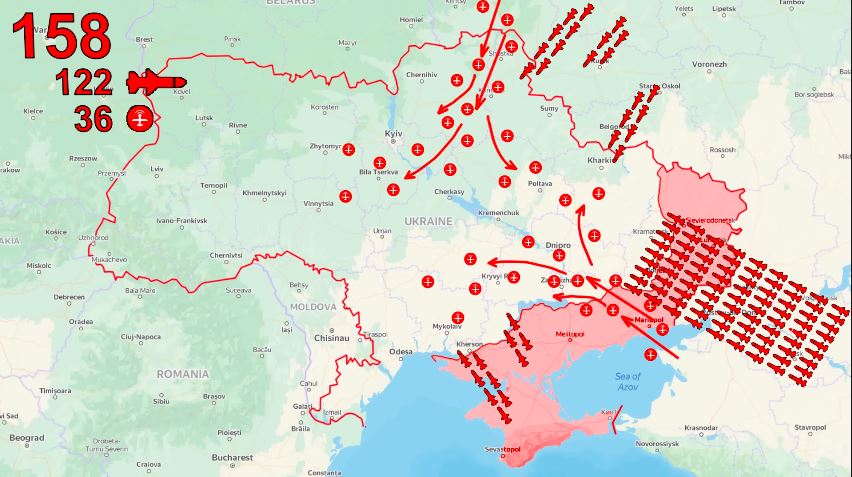
In total, there were 158 targets – more specifically, 122 missiles and 36 drones. The Ukrainian General Staff reported that 87 missiles and 27 drones were shot down, implying a 73% success rate. Unfortunately, this means that 33 missiles and 9 drones reached their targets.
The main targets of these missiles and drones became the biggest cities in Ukraine: Kyiv, Kharkiv, Dnipro, Zaporizhzhia, Odesa, and Lviv. In Kyiv, according to Russian sources, Russian forces struck at least 5 unspecified warehouses, presumably with Ukrainian military equipment.
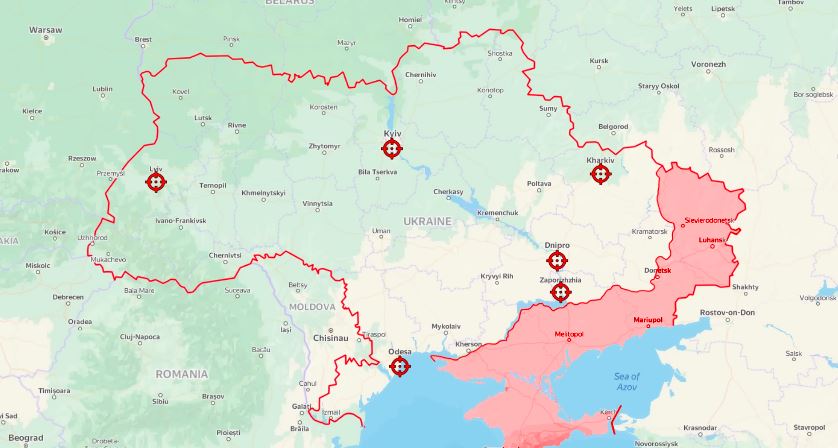
Ukrainian sources reported that multiple civilian areas suffered from the strike, including a residential building, an office, and the outskirts. It seems like Russians also tried to target the rocket factory, however, hit the nearby subway station, rendering the whole line inoperable.
In Dnipro, according to Ukrainian sources, Russian forces struck a huge shopping mall in the center of the city. Moreover, one drone or rocket hit a maternity hospital. Fortunately, all the women and infants were in the bunker, so everyone survived.
Russian sources reported that the storage facilities inside the shopping mall were used for military purposes and that other targets were areas of forces concentrations.
In Odesa and Zaporizhzhia, according to Russian sources, Russian forces struck the port and other infrastructure, a warehouse with equipment, factory “Iskra”, and a secret, industrial zone.
Ukrainian sources reported that apart from hitting port infrastructure, at least one rocket hit a residential building, and another fell near a school in Odesa, and in Zaporizhzhia, residential areas on the outskirts suffered the most.
In Kharkiv, Russians reportedly hit multiple industrial zones, warehouses, and tram depots. Judging by the lack of footage from the region, the Russian strike here was the most successful. And this is not surprising, as the city is located just 25 kilometers from the border, giving a very short time to react.
Moreover, Russians purposefully use ballistic missiles in this region. Ukrainian Air Force Spokesman stated that ballistic missiles can only be intercepted with special air defense systems, such as the Patriots, which Ukrainians obviously do not have enough to cover the whole of Ukraine – just a few of the most important areas.
The massive missile strike did not come as a surprise, as Ukrainian intelligence was continuously issuing warnings that Russians had been accumulating missiles for winter. In fact, just yesterday, Ukrainian military officials told the public that Russians may want to try to spoil the last three days before the New Year, just like last year.
The goal of this symbolic campaign is threefold.
- The Russian public seems to respond overwhelmingly positively to massive missile strikes because it generates a sense of superiority and, therefore, improves the general mood of the population ahead of the presidential speech on New Year’s night, which has become much more than a tradition.
- Russians are using this strike to make sure that the released bad news goes unnoticed – for example, today, it was revealed that Russians suffered far greater losses from the Ukrainian missile strike on the Russian warship than even Ukrainians estimated. In total, Russians lost more than 100 soldiers, including conscripts who were not supposed to be there. Normally, the release of such information would lead to a huge backlash and societal discontent, but today, no Russian source even mentions that.
- Thirdly, by conducting constant missile strikes at this time, Russians are aiming to completely spoil the New Year for Ukrainians and create social unrest that would supposedly pressure Zelensky to end the war at any cost.
The Ukrainian Minister of Defense stated that we, therefore, should expect more strikes. Fortunately, Ukrainians were expecting such a sequence of events, and for the last half a year, they have been focused on improving their air defense as much as possible. That is why, today, Ukrainians did not experience any blackouts or or other major disruptions.
Such a massive strike also served as a precedent for the Western countries to provide even more air defense systems, especially as Russian missiles were once again detected in the sky above the NATO countries, this time only Poland. So, Western countries seem to be interested in ensuring that Ukraine shoots down all Russian missiles before they even get close to the NATO border.
In our daily frontline report, we pair up with the military blogger Reporting from Ukraine to keep you informed about what is happening on the battlefield in the Russo-Ukrainian war.




